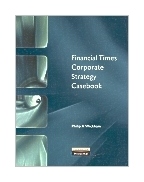|
||
• wydawnictwa polskie
• Zamów informacje o nowościach z wybranego tematu • kontakt
• Cookies na stronie |
FINANCIAL TIMES CORPORATE STRATEGY CASEBOOKWICKHAM P.wydawnictwo: FT/PH , rok wydania 2000, wydanie Icena netto: Financial Times Corporate Strategy Casebook The managers of modern businesses are presented with ever-growing challenges. Increasingly complex organisational processes as well as structures must be managed if value is to be delivered to customers and investors. The pace of globalisation is increasing competitive pressures and this demands that managers must take a broader and deeper view of their business environment. Investment capital flows increasingly fast and the speed with which good decisions are rewarded and poor ones punished is accelerating. Information technology makes increasing amounts of information available and managers must not only process this information but also learn to use it to make their businesses more competitive. Customer tastes change quickly, moving the competitive goalposts, which is increasing the pace of innovation. Successful innovation demands focusing and leading the whole organisation. The rewards for innovation are considerable, but so are its risks. The discipline of strategic management has risen to help managers meet these challenges. Strategic management offers both a philosophy of management and a set of methods that can guide managers in the decisions they must make. As a philosophy, strategic management looks towards the whole organisation and the integration of its parts towards specific goals. It councils against an introspective approach to management and insists that managers must look beyond the bounds of their organisations. They must consider the way in which the business can be shaped to fit its environment. External resources must be acquired and used effectively so that the business is able to exploit the opportunities the environment presents and avoid the threats it poses. The business must be positioned in its marketplace so that it can develop a sustainable competitive advantage in the face of competitive pressures. Strategic management also presents a 'tool-kit' of ideas built on the foundations of this philosophy. These tools can help the manager analyse the environment the business is in, assess the opportunities and challenges it presents and then evaluate the business capabilities in relation to the environment's potential to take advantage of what it offers. Having guided analysis, strategic management offers frameworks that can be used to generate decision options, to assess them and to shape the final decision successfully. This book aims to present a comprehensive and accessible account of strategic management as a philosophy, as a set of analysis methods and as a framework for supporting decision-making. It will be of value to students of management and business studies and to general managers wishing to enhance their decision-making abilities. The book covers the ground of strategic management courses at undergraduate level and offers a primer for postgraduate students who wish to specialise in strategy. It can be used for both active learning about what strategic ideas have to offer and as a source of ideas when facing practical management challenges. The book includes articles from the Financial Times which may be used to support learning. They present a variety of real, current and critical management issues, highlight the challenges strategic managers face and demonstrate the value of strategic management in guiding tneir successrui resolution. a series or review questions are provided with each chapter to guide the student's consideration of the articles and animate discussion. In addition, some suggestions for further reading are provided. These suggestions are not intended to give a comprehensive review of the themes in the chapter. They are an invitation to students to deepen their learning by exploring the ideas from their source and well-written, accessible and thought-provoking commentaries on them. The book is organised into six key blocks. The first block (Chapters 1 and 2) set the scene. These chapters deal with the idea of strategy and strategic management in broad terms: what they are and how they fit with modern management practice. The second block (Chapters 3 to 9) is concerned with the first stage of strategic management: the strategic analysis of the business and its environment. Chapters 10, 11 and 12 address fundamental issues: the purpose of the firm, what it aims to achieve and how a good strategy can deliver rewards to all its stakeholders and the role of knowledge and innovation in creating an effective strategy. The fourth block (Chapters 13 to 17) considers the way in which a range of strategic options can be generated and assessed in terms of their potential to deliver the firm's objectives and the best options selected. Chapter 18 brings in the structural and human dimension of strategy-making and Chapter 19 considers strategy in a global context. The final block (Chapters 20 to 22) addresses strategy from a dynamic perspective and deals with the practical issues managers face in implementing their strategic ideas and making them happen in real business organisations. Strategic management represents a large, and rapidly growing, body of knowledge. This book aims to be a broad-based review and source of the key themes. It does not aim to explore these ideas in great depth or to develop a critical discussion of them. Richard Lynch's Corporate Strategy (Second Edition, Financial Times Prentice Hall 1999) offers a thorough and detailed account of strategic management concepts from a perspective which emphasises the importance of strategic thinking that delivers value in dynamic, human organisations. This casebook is written to parallel the structure of Lynch's Corporate Strategy and it is recommended that the two books be used in partnership. Together they aim to provide the key learning resource for all students and managers who want to be more effective strategic decision-makers. 417pp Księgarnia nie działa. Nie odpowiadamy na pytania i nie realizujemy zamówien. Do odwolania !. |


